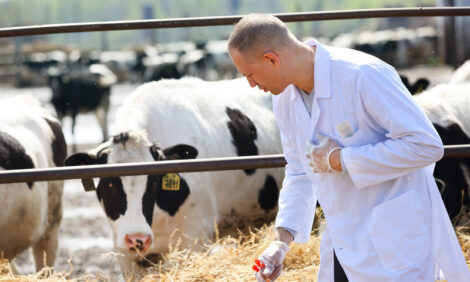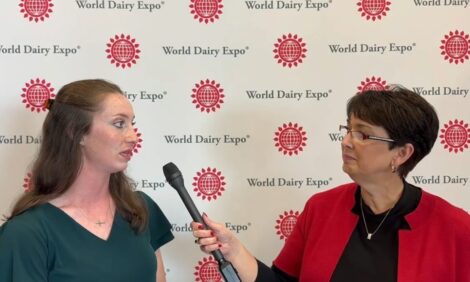



Dairy Farmers Demand EU Commission Action on Milk Prices
EU - Stripped to the bone, standing in front of the European Commission in the middle of mountains of milk powder – the dairy cow that provides milk to Europe's citizens, the European Milk Board (EMB) reports."Around her fly the flags of many European countries, held by farmers who collect this milk on a daily basis. They as well have been shaken by the constantly recurring dairy crises," says the European Milk Board (EMB).
In spite of the current high butter prices, the dairy sector remains in its chronic poor state because the Common Agricultural Policy (CAP) lacks a mechanism to prevent crises.
The frequency of crises in the sector is alarming and has not only driven many farms out of business in recent years, but has also severely destabilised the farms that continue their activity, as Sieta van Keimpema, vice president of the European Milk Board (EMB), reports.
Forced cuts are usually made at the cost of animal welfare – read: lifespan – as well as the farmer and his family's living and working conditions, says Ms van Keimpema.
"It is an impossible situation for the last link in the milk production chain, which has received no consideration in policy to date. Major distortions in competition on the dairy market have, for many years, led to prices that are significantly lower than inherent production costs," says Ms van Keimpema.
A study was published yesterday (26 October) by BAL (Office for Agriculture and Agricultural Sociology).
The study - which calculates milk production costs in five key milk-producing countries - documents this deficit.
It has revealed that even so-called "better years" were unable to compensate for these losses.
The study shows that since 2012, the annual average deficit in France has been 21 per cent, in the Netherlands 23 per cent, in Germany 22 per cent, in Belgium 24 per cent, and in Denmark 17 per cent.
EMB is clarifying that farmers are not asking for subsidies to produce milk. What they need is a mechanism that would finally safeguard the sector from further hard-hitting crises.
According to the Milk Board, this mechanism needs to be flexible enough to allow growth in the sector and also cater to increasing demand.
This mechanism must be legally anchored in the CAP, the European Milk Board has stressed.
EMB says, "As the past has clearly shown, the absence of such provisions means that reactions come too late and even then, often lead to nowhere."
The Board's specific proposal is to complement the Milk Market Observatory with a permanent mechanism that could temporarily limit or reduce production in the event of crises.
Exploitation in the dairy sector can be stopped and the chronic difficult, painful times can be curtailed if a legal provision in the CAP were to sustainably regulate voluntary production cuts in the future, says EMB.
You can view the BAL study on the cost of milk production in Europe by clicking here.
You can find further information on The Market Responsibility Programme by clicking here.
TheCattleSite News Desk


